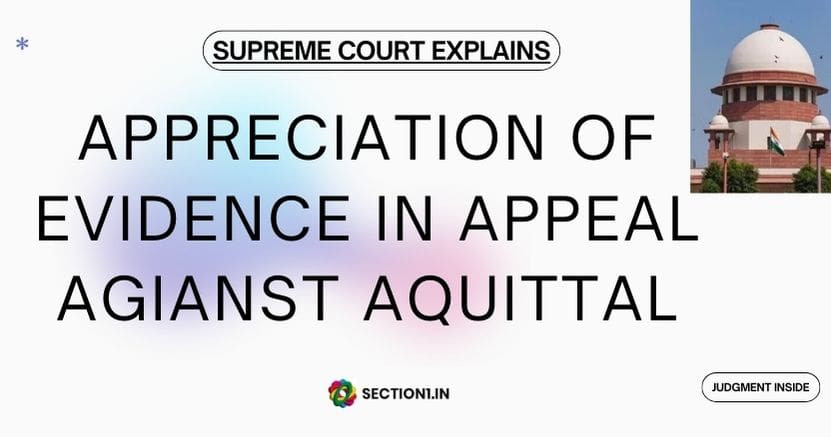HIGH COURT HOW TO DECIDE AN APPEAL AGAINST ACQUITTAL – EXPLAINED
- In this appeal, we are called upon to consider the legality and validity of the impugned judgment rendered by the High Court while deciding an appeal against acquittal under Section 378 of the Code of Criminal Procedure, 1973 (for short, ‘Cr.P.C.’). The principles which govern the exercise of appellate jurisdiction while dealing with an appeal against acquittal under Section 378 of Cr.P.C. can be summarised as follows: –
(a) The acquittal of the accused further strengthens the presumption of innocence;
(b) The Appellate Court, while hearing an appeal against acquittal, is entitled to re-appreciate the oral and documentary evidence;
(c) The Appellate Court, while deciding an appeal against acquittal, after re-appreciating the evidence, is required to consider whether the view taken by the Trial Court is a possible view which could have been taken on the basis of the evidence on record;
(d) If the view taken is a possible view, the Appellate Court cannot overturn the order of acquittal on the ground that another view was also possible; and
(e) The Appellate Court can interfere with the order of acquittal only if it comes to a finding that the only conclusion which can be recorded on the basis of the evidence on record was that the guilt of the accused was proved beyond a reasonable doubt and no other conclusion was possible.
- Normally, when an Appellate Court exercises appellate jurisdiction, the duty of the Appellate Court is to find out whether the verdict which is under challenge is correct or incorrect in law and on facts. The Appellate Court normally ascertains whether the decision under challenge is legal or illegal. But while dealing with an appeal against acquittal, the Appellate Court cannot examine the impugned judgment only to find out whether the view taken was correct or incorrect. After re-appreciating the oral and documentary evidence, the Appellate Court must first decide whether the Trial Court’s view was a possible view. The Appellate Court cannot overturn acquittal only on the ground that after re-appreciating evidence, it is of the view that the guilt of the accused was established beyond a reasonable doubt. Only by recording such a conclusion an order of acquittal cannot be reversed unless the Appellate Court also concludes that it was the only possible conclusion. Thus, the Appellate Court must see whether the view taken by the Trial Court while acquitting an accused can be reasonably taken on the basis of the evidence on record. If the view taken by the Trial Court is a possible view, the Appellate Court cannot interfere with the order of acquittal on the ground that another view could have been taken.
DEMEANOR OF WITNESS
- There is one more aspect of the matter. In many cases, the learned Trial Judge who eventually passes the order of acquittal has an occasion to record the oral testimony of all material witnesses. Thus, in such cases, the Trial Court has the additional advantage of closely observing the prosecution witnesses and their demeanour. While deciding about the reliability of the version of prosecution witnesses, their demeanour remains in the back of the mind of the learned Trial Judge. As observed in the commentary by Sarkar on the Law of Evidence, the demeanour of a witness frequently furnishes a clue to the weight of his testimony. This aspect has to be borne in mind while dealing with an appeal against acquittal.
SECTION 149 IPC
- Coming back to the facts of the case, after having carefully perused the impugned judgment, we find that there is no discussion about the testimony of eyewitnesses for deciding whether their testimony could be believed. In fact, there are no findings recorded by the High Court after reappreciating the evidence. There is not even a finding to indicate that the High Court considered the question whether the view taken by the Trial Court was a possible view. Without recording any reasons and without recording any finding regarding the role played by the appellants individually and collectively, the High Court has jumped to the conclusion that the guilt of the accused has been established. The judgment does not throw any light on the question who were the authors of the injuries sustained by the deceased and the injured witnesses. There is no finding as to how Section 149 of IPC gets attracted.
xxx
- There was a fight over property between the accused and the family of the complainant. After in-depth scrutiny of the testimony of the eyewitnesses, for the reasons recorded, the Trial Court was unable to accept their testimony. After having examined the evidence of the material prosecution witnesses and findings of the Trial Court, we must hold that the conclusions recorded by the Trial Court were possible conclusions which could have been recorded on the basis of the evidence on record.
-
Therefore, the appeal succeeds, and we set aside the impugned Judgment dated 21st September 2010. We direct that unless the appellants are required to be detained in custody in connection with some other case, they shall be forthwith set at liberty.
-
The Appeal is accordingly allowed.
PARTIES: H. D. SUNDARA & ORS vs. STATE OF KARNATAKA – Criminal Appeal No. 247 of 2011 – September 26, 2023.
https://main.sci.gov.in/supremecourt/2010/38392/38392_2010_11_1501_47228_Judgement_26-Sep-2023.pdf


![Common intention [section 34 IPC]: Since appellant were together there was time available for meeting of minds](https://section1.in/wp-content/uploads/2023/12/Learn-how-to-change-your-life-in-3-simple-steps.jpg)

